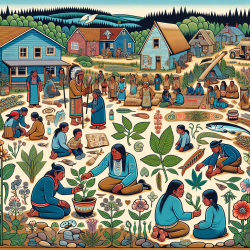Introduction
Asthma is a prevalent chronic disease affecting many Aboriginal children in Canada, yet specific support strategies for these communities have only recently begun to be identified. The research article "Asthma Prevention and Management for Aboriginal People: Lessons From Mi’kmaq Communities, Unama’ki, Canada, 2012" provides invaluable insights into culturally relevant asthma management practices. This blog post will explore how practitioners can enhance their skills by implementing the outcomes of this research or by delving deeper into further studies.
Key Findings from Mi’kmaq Communities
The study conducted in five Mi’kmaq communities in Unama’ki (Cape Breton), Nova Scotia, revealed three primary areas of opportunity and challenge for implementing asthma prevention and management initiatives:
- Professional Awareness: Many healthcare and educational professionals were unaware of the extent of asthma-related issues within the community. This lack of awareness can lead to underdiagnosis and inadequate support for affected families.
- Local School Issues: Schools play a crucial role in supporting children with asthma. However, existing policies and a lack of asthma education for staff can hinder effective management.
- Community Health Centers: These centers often lack the resources and expertise needed to provide adequate asthma support. Culturally relevant initiatives and community-driven approaches are essential for improvement.
Implementing Culturally Relevant Asthma Management
Practitioners can improve their skills by focusing on culturally relevant asthma management practices. Here are some steps to consider:
- Enhance Professional Awareness: Conduct training sessions for healthcare and educational professionals to raise awareness about the prevalence and impact of asthma in Aboriginal communities. Encourage self-identification among students and families to better understand the community's needs.
- Revise School Policies: Work with school administrators to create asthma-friendly policies that allow students to carry and use their medication. Implement educational programs for both staff and students to foster a supportive environment.
- Strengthen Community Health Centers: Invest in professional development for health center staff to improve their asthma expertise. Establish partnerships with respiratory health service organizations to provide additional resources and support.
Encouraging Further Research
While the findings from the Mi’kmaq communities provide a solid foundation, further research is needed to expand our understanding of asthma management in Aboriginal populations. Practitioners are encouraged to explore additional studies and collaborate with local communities to develop tailored interventions that address specific needs.
Conclusion
The research conducted in Mi’kmaq communities highlights the importance of culturally relevant, community-driven asthma management practices. By implementing these strategies, practitioners can enhance their skills and provide better support for Aboriginal children with asthma and their families. To read the original research paper, please follow this link: Asthma Prevention and Management for Aboriginal People: Lessons From Mi’kmaq Communities, Unama’ki, Canada, 2012.










